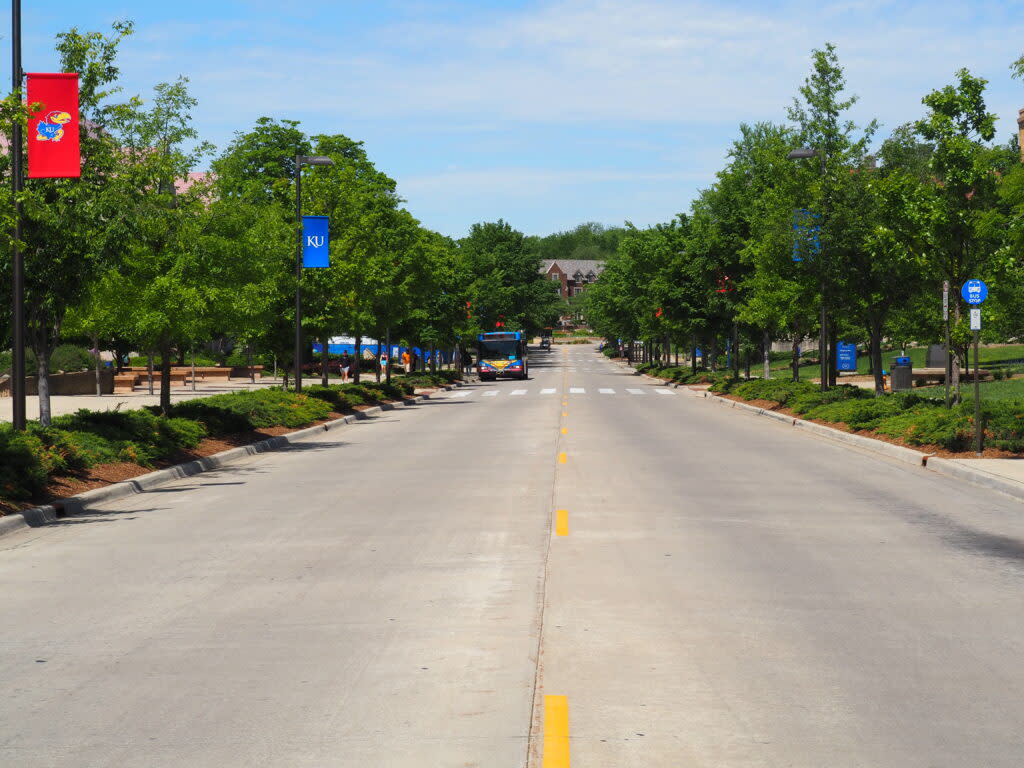On college campuses and in Kansas Statehouse, a worrying lack of respect from leaders

After two days of pro-Palestinian protests at the University of Kansas, the campus on May 3 in Lawrence took on the feel of a sober, mundane summer day. The rhetoric of Kansas politicians who denounced the demonstrators was red hot. (Tim Carpenter/Kansas Reflector)
The problem? Disrespect. From “respectable” people.
It’s comfortable but dangerous to ignore public officials engaging in it. Their disrespect runs contrary to U.S. constitutional wisdom and that of most religions and traditions: We are all (created) equal. Several water-related metaphors say it best, especially with water so critical — actually and metaphorically — to our survival: We sink or swim together. We are all in the same boat.
Devotion to this central truth by U.S. universities (and education generally) has existed for decades, through efforts at diversity, equity and inclusion. Remember Title IX?
Students who seriously devote themselves to truth seek out larger moral and ecological issues, shape their lives according to science and investigation, apply facts, and accept the practical consequences.
As a result, many have recently taken to streets and campuses — some at great personal risk — asking their universities to stop participating, economically or otherwise, in the indiscriminate slaughter of Palestinians (now well over 38,000) by the state of Israel.
You’d think they would be applauded, but no. Not from some of Kansas’ highest public officials.
Attorney General Kris Kobach aimed his words at the University of Kansas and all state universities: “As is often the case with uninformed, petulant loudmouths, (the protesters) have not done their research. And their views are reprehensible.”
“The University of Kansas has many hallowed traditions,” he said, “but siding with bloodthirsty, antisemitic terrorists is not one of them. I encourage you to enforce all applicable university rules and regulations so that the educational mission of the university is not disrupted.”
“Uninformed, petulant loudmouths”? “Reprehensible”? “Bloodthirsty, antisemitic terrorists”? While supposedly protecting the respectable, Kobach dispenses disrespect.
I will spare you the chorus of similar, but only slightly less flammable, comments from other Kansas Republican representatives. Or the kneejerk, unconditional, pro-Zionist resolution passed in January by the Kansas Legislature. Their ignorance could be dismissed, but their attitudes shape our laws and our lives.
officials disrespect our own children — and fellow adults. They disrespect citizens taking actions based on higher education and higher purpose to achieve a much higher goal than some high-dollar job in some hazy future.
– David Norlin
In all cases, the disrespect and ignorance is blatant. Anyone outside the “respectable” is disdainfully regarded as an “other.” In this case, officials disrespect our own children — and fellow adults. They disrespect citizens taking actions based on higher education and higher purpose to achieve a much higher goal than some high-dollar job in some hazy future.
What do these disrespecters lack? Any commitment to diversity, equity and inclusion. Any truly higher education. And any commitment to humanity as a whole. These public office disrespecters, in fact, just passed a new law weaponizing the fight against DEI in higher education.
Rep. Steven Howe, R-Salina, said: “Universities have chosen to embrace ideologies which discriminate against people that do not hew to their orthodoxy.”
Which orthodoxy should be in question is the question.
To be fair, those folks would not be in office if we didn’t share some of their ignorance. In all cases, however, shifting blame spares us the pressing, aching need to examine our own unquestioned values and practices — practices that, if left unexamined, will lead to our eventual demise. Such self-examination requires stepping back from knee-jerk condemnation or stereotyping. It’s difficult. It is, however, absolutely necessary.
To assist in self-examination, another water metaphor is helpful. Remember the now-hackneyed expression that a fish has no idea what water is? Unless we’ve been out of it, we have nothing to compare it with.
The Rev. angel Kyodo williams, discussion leader at the “Beloved Community: Healing What Separates Us” gathering several years back, shared a helpful perspective.
She spoke about whiteness: “That dominant view includes ways to behave, perceive things, show up in the room, body language, even the tone of voice. All of these things are held as though there is a central ‘is-ness’ to it, and everything else is other. So when we think about being inclusive, our inclination is to say, ‘Oh, how can we get more of that “otherness” to be more like “this-ness”?’ And then we’re including you. … Whiteness is not all there is. It is not ‘the thing’ that everything else should organize itself around in order to be included.”
Once we can escape our own “is-ness” and expand our world, we can observe it from mountaintops rather than the bottom of our particular pond. Understanding and embracing all beings opens us to respect for all — including ourselves.
That can put an end to disrespect.
David Norlin is a retired Cloud County Community College teacher, where he was department chairman of communications/English, specializing in media. Through its opinion section, the Kansas Reflector works to amplify the voices of people who are affected by public policies or excluded from public debate. Find information, including how to submit your own commentary, here.
The post On college campuses and in Kansas Statehouse, a worrying lack of respect from leaders appeared first on Kansas Reflector.

